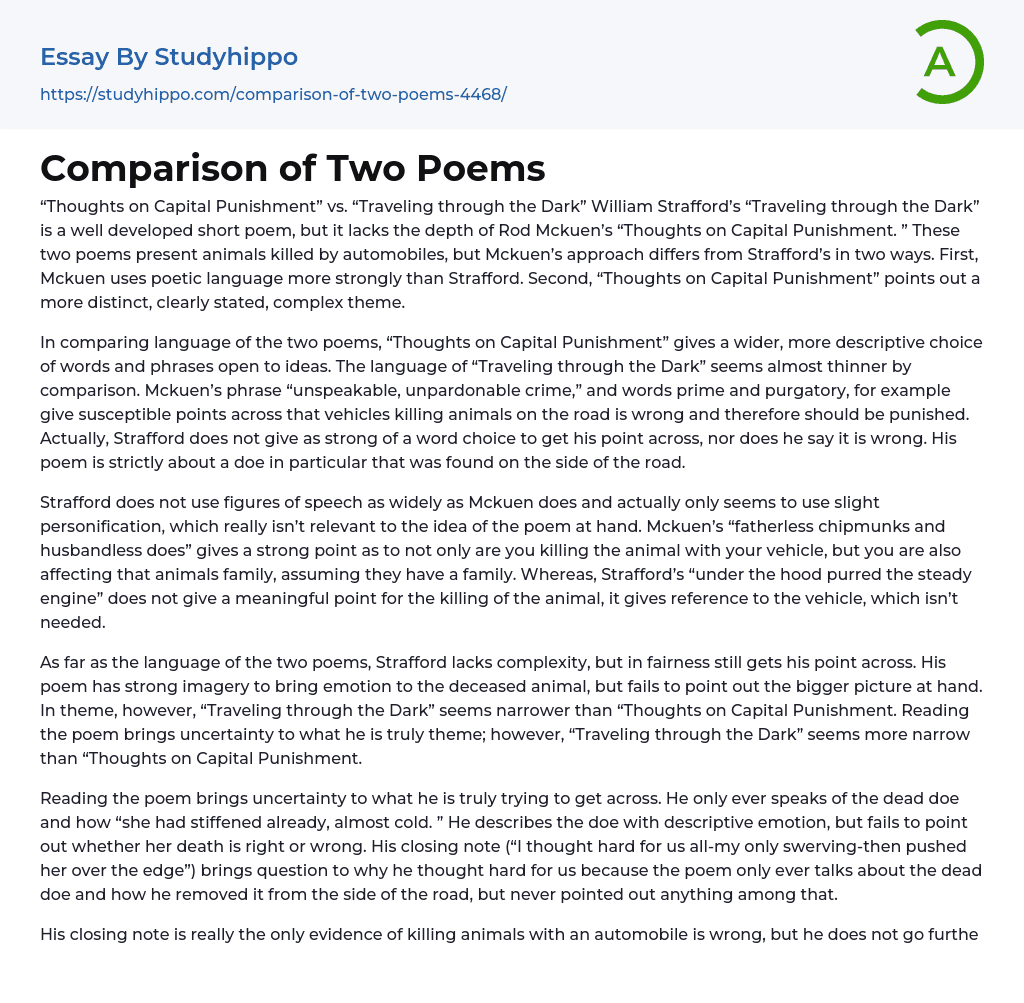“Thoughts on Capital Punishment” vs. “Traveling through the Dark” William Strafford’s “Traveling through the Dark” is a well developed short poem, but it lacks the depth of Rod Mckuen’s “Thoughts on Capital Punishment. ” These two poems present animals killed by automobiles, but Mckuen’s approach differs from Strafford’s in two ways. First, Mckuen uses poetic language more strongly than Strafford. Second, “Thoughts on Capital Punishment” points out a more distinct, clearly stated, complex theme.
In comparing language of the two poems, “Thoughts on Capital Punishment” gives a wider, more descriptive choice of words and phrases open to ideas. The language of “Traveling through the Dark” seems almost thinner by comparison. Mckuen’s phrase “unspeakable, unpardonable crime,” and words prime and purgatory, for example give susceptible
...points across that vehicles killing animals on the road is wrong and therefore should be punished. Actually, Strafford does not give as strong of a word choice to get his point across, nor does he say it is wrong. His poem is strictly about a doe in particular that was found on the side of the road.
Strafford does not use figures of speech as widely as Mckuen does and actually only seems to use slight personification, which really isn’t relevant to the idea of the poem at hand. Mckuen’s “fatherless chipmunks and husbandless does” gives a strong point as to not only are you killing the animal with your vehicle, but you are also affecting that animals family, assuming they have a family. Whereas, Strafford’s “under the hood purred the steady engine” does not give a meaningful point for the killing of the animal, it gives reference to the vehicle, which isn’t
needed.
As far as the language of the two poems, Strafford lacks complexity, but in fairness still gets his point across. His poem has strong imagery to bring emotion to the deceased animal, but fails to point out the bigger picture at hand. In theme, however, “Traveling through the Dark” seems narrower than “Thoughts on Capital Punishment. Reading the poem brings uncertainty to what he is truly theme; however, “Traveling through the Dark” seems more narrow than “Thoughts on Capital Punishment.
Reading the poem brings uncertainty to what he is truly trying to get across. He only ever speaks of the dead doe and how “she had stiffened already, almost cold. ” He describes the doe with descriptive emotion, but fails to point out whether her death is right or wrong. His closing note (“I thought hard for us all-my only swerving-then pushed her over the edge”) brings question to why he thought hard for us because the poem only ever talks about the dead doe and how he removed it from the side of the road, but never pointed out anything among that.
His closing note is really the only evidence of killing animals with an automobile is wrong, but he does not go further with the idea like Mckuen does. Mckuen’s closing note (“who kills a man kills a bit of himself, But a cat too is an extension of God”) goes further with the idea that men that kill other men are criminals, but men that kill cats or any other animal is also a criminal. He puts forth that animals are living as well as man, so there death should be treated like a
man death in the assumption they were killed. In both language and theme, “Thoughts on Capital Punishment” climbs much higher in comparison.
- Animal Cruelty essays
- Law Enforcement essays
- Juvenile Justice System essays
- Surveillance essays
- Forensic Science essays
- Crime Prevention essays
- Criminal Justice essays
- Criminology essays
- Drug Trafficking essays
- Juvenile Delinquency essays
- Organized Crime essays
- Penology essays
- Prison essays
- Property Crime essays
- Punishment essays
- Serial Killer essays
- Sexual Offence essays
- Victim essays
- Crime scene essays
- Punishments essays
- Charles Manson essays
- Juvenile Crime essays
- Piracy essays
- Stealing essays
- Gang essays
- Hate Crime essays
- Homicide essays
- Damages essays
- Murder essays
- Robbery essays
- Ted Bundy essays
- Prostitution essays
- Violent crime essays
- Rape essays
- Identity Theft essays
- Sexual Harassment essays
- Distracted Driving essays
- Drunk Driving essays
- Detention essays
- Sexual Assault essays
- Sexual Assault on College Campuses essays
- Cyber Crime essays
- White Collar Crime essays
- Fur essays
- Federal Bureau Of Investigation essays
- Fire Department essays
- Criminal Justice System essays
- Commitment essays
- Mass Incarceration essays
- Kill essays




